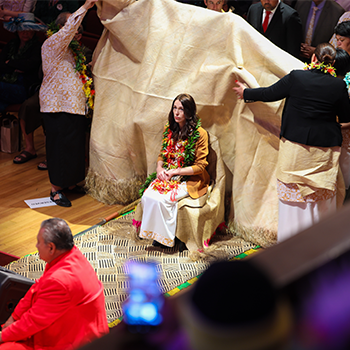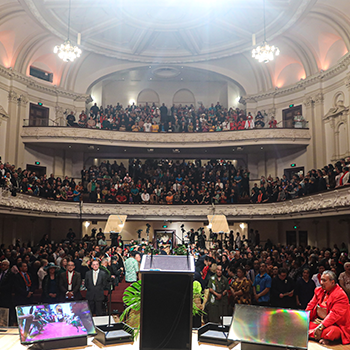Dawn Raids Apology
Dawn Raids Apology


The Dawn Raids Apology took place on Sunday 1 August, 2021.
The livestream of the event is available on Facebook
A commemoration event for the Dawn Raids was held at the Auckland Town Hall on Sunday 1 August hosted by the Minister for Pacific Peoples.
What were the Dawn Raids and why was an apology made?
From the 1950s to 1970s, migration from the Pacific to Aotearoa was encouraged to support New Zealand’s manufacturing and primary production sectors. New Zealand’s economy then suffered a downturn from the early 1970s and Pacific peoples were specifically targeted due to perceptions they were causing job shortages and other social harms.
Between 1974 and 1976, rigorous enforcement of immigration policies was applied with officials conducting targeted raids on the homes of Pacific families, often early in the morning or late at night, giving rise to the term the “Dawn Raids”.
The Dawn Raids produced considerable public outcry at the time from Pacific leaders, churches, media organisations and groups including the Polynesian Panther Party, Ngā Tamatoa, Amnesty Aroha, the Federation of Labour and the Citizens Association for Racial Equality (CARE) who protested the targeting of Pacific peoples.
The Polynesian Panther Party submitted a written request to the Government to apologise for the Dawn Raids. The Minister for Pacific Peoples directed the Ministry for Pacific Peoples to meet the Polynesian Panther Party as the first step of a comprehensive research process to support government decision-making.
After meeting with the Polynesian Panther Party in February 2021 to explore the request, advice was provided to the Minister for Pacific Peoples, following a robust research and cross-government consultation period.
The Government gave careful consideration to the request, and a Cabinet paper that proposed an apology be given to communities and individuals impacted by the Dawn Raids was considered by Cabinet and approved on 14 June 2021.
This was announced by the Prime Minister, Rt Hon Jacinda Ardern, and the Minister for Pacific Peoples, Hon Aupito William Sio. The Government made a formal apology at the event.
Any questions about Dawn Raids can be directed to [email protected].
An event to commemorate the Dawn Raids Apology and strengthen kinship ties between Pacific Peoples of Aotearoa and tangata whenua was held on Saturday 27 August 2022.
“This event not only commemorates the one-year anniversary of the Dawn Raids apology, but also symbolises the past, present and future journey of Pacific in Aotearoa,” Aupito William Sio said.
The event celebrated a new future between Pacific Aotearoa and Ngāti Whātua Ōrākei, who hosted the first-year anniversary of the Dawn Raids apology at Ōrākei Marae in Auckland.
The offer to host the event was made during cultural exchanges during the Dawn Raids Apology made by Prime Minister Jacinda on Sunday 1 August, 2021.
Pacific leaders and communities congregated at Ōrākei Marae to reflect on the past and celebrate the future though a cultural celebratory platform to encourage ongoing discussions between Māori and Pacific on strengthening whanaungataga ties as peoples of the vast Blue Pacific Continent.
Discussions were held around working together to shape the future of Aotearoa New Zealand, which is free from racism and discrimination.
The event also included a formal ceremony to celebrate round one recipients of the Teu la Va – Dawn Raids History Community Fund – and launch a second round of the fund, which has received additional Government investment.
The Teu le Va - Dawn Raids History Community Fund was established as part of the Dawn Raids apology by the Government. This fund was part of a reconciliation process to capture a historical account of the Dawn Raids.
Successful applicants received funding to share stories of experiences of the Dawn Raids so they could generate, preserve, raise awareness and pass on knowledge of this time in history.
Applicants were able to apply by submitting an application for up to $5,000, with exceptions where applications could receive more than $5,000 at the discretion of the assessment panel. A list of funding recipients and amounts received can be viewed on our Teu le Va Community Fund page.
In August 2022, a second round of Teu le Va funding was announced.
Frequently asked questions
The Dawn Raids Cabinet material was released following the Dawn Raids Apology event. You can view this material on our Ministers and Cabinet page.
The “Dawn Raids” is a term that arose when raids took place early in the morning or late at night to find overstayers who were subsequently convicted and deported from New Zealand under the Immigration Act 1964.
These occurred between 1974 and 1976 and the majority of those targeted in these raids were Pacific peoples.
From the 1950s through to the 1970s, migration was encouraged from the Pacific region to New Zealand to meet the domestic labour shortage in manufacturing and primary production industries.
Many Pacific peoples travelled to New Zealand on temporary visas and due to labour shortages, enforcement of visas was relaxed. However, at the downturn of the economy in the early 1970s, parts of society began to see migrants as jeopardising their financial security and quality of life.
Pacific peoples were targeted because of perceptions that they were causing job shortages and other social harms. These perceptions were perpetuated by less than favourable media portrayals of Pacific peoples.
There are a range of estimates for the number of people that were unlawfully in New Zealand or illegal “overstayers” during the Dawn Raids period. Between 1974 and 1976, there were an estimated 5,000 to 12,000 overstayers.
When computerised immigration records were introduced in 1977, they provided a picture of overstaying patterns, and revealed that 40 percent of overstayers did not come from the Pacific sources of Samoa, Tonga and Fiji. This 40 percent included those from Great Britain, the United States and other countries.
Throughout the Dawn Raids period, Police also carried out random stop checks in public, requiring people of non-European looking descent to provide evidence they were legally in New Zealand. Some individuals were caught up in these checks, despite their lawful status in New Zealand.
A 1986 investigation by the then Race Relations Conciliator, into allegations of discrimination in the application of immigration laws, found that between 1985 and 1986, while Pacific peoples comprised roughly a third of overstayers, they represented 86 percent of all prosecutions.
In comparison, those from the United States and Great Britain, who also comprised around a third of all overstayers, accounted for only 5 percent of all prosecutions.
It is understood that police would stop and question anyone who did not look like a New Zealander, or who spoke with a foreign accent, and admitted that almost all of those questioned were Pacific.
A range of other source materials such as internal Police investigations, news articles of individuals’ accounts, and academic works also point to a race-based application of immigration policy.
While Pacific peoples were disproportionately impacted by the Dawn Raids, other non-European ethnic minorities and Māori were racially targeted in random stop checks. This targeting was achieved through racial, ethnic, and colour-based profiling.
Investigations and research have found that Pacific communities were excessively and disproportionately targeted by authorities on the basis of race. Unjustified racial discrimination has never been acceptable as this is a breach of fundamental human rights and freedoms.
Between 1985 – 1986, Pacific people made up around a third of overstayers and accounted for 86 per cent of all prosecutions, compared to those from the United States and Great Britain, who also made up about a third of overstayers, but accounted for only 5 per cent of all prosecutions.
There is a compelling case for the government to make a formal public apology for the Dawn Raids.
A formal apology will make a profound difference for Pacific communities, and other communities who were impacted by the Dawn Raids. This is the first step towards closure and a reconciliation process for the hurt caused to these communities.
It is also an opportunity for everyone to recognise and promote the protection of human rights and the importance of eliminating racism in all its forms.
